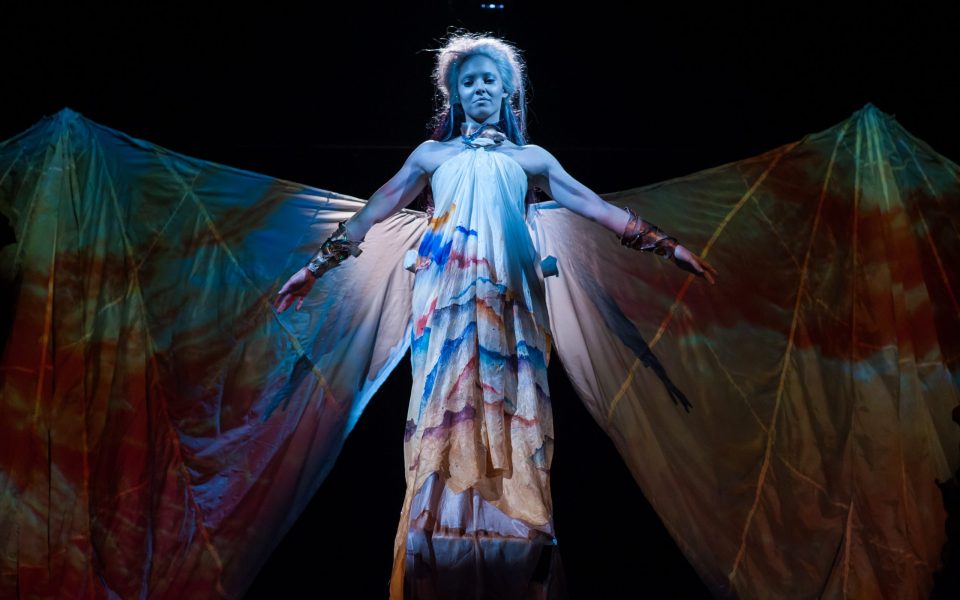by Brian Clarey
I remember the first time I ever heard the word AIDS.
It was the winter of 1983-84, and I was in middle school on Long Island, just a few miles away from New York City, where the plague had not yet begun to take its terrible toll on the gay and creative communities. I didn’t fully understand it then — I was 13 — but really no one did beyond the notion that there was some sort of “gay cancer” going around. In 1984, “Ayds” was a diet candy that ran ads on daytime TV.
Context is important in this memory: The word was deployed to me as an insult, an example of insulated suburban kids already practicing the art of demonizing the other. Kids from the suburbs, the subtext insisted, did not get AIDS.
But of course, they did. By 1986 more than 16,000 Americans had died from the virus, many of them straight.
And by 1993, the year Angels in America won the Pulitzer Prize for drama, the death toll had risen to more than 40,000.
Even more context: That was right around the time that most of the cast of the UNC School of the Arts production of Angels in America was born.
It’s a challenging play to stage, and interpreting it can be as confounding as the AIDS crisis itself, which has thus far claimed about 650,000 American lives, with another 1.2 million currently living with the disease.
UNCSA’s troupe adheres to playwright Tony Kushner’s original version, which in its entirety runs seven hours in two parts, and — thankfully — tackled just the first half, Millennium Approaches. Also true to Kushner’s vision is the sparseness of the set, made to look like the unpainted walls of a Brooklyn apartment and upon which flash newspaper headlines, portraits of Reagan and other emanations. Kushner wrote a play for actors, loaded with great dialogue, poignant speeches and enough plot to challenge any of the student performers. Not many university drama programs would take on such difficult material, but then, this is UNCSA.
The story marries two plotlines: Joe Pitt, a closeted Mormon lawyer living in New York in 1985, has become an acolyte of the famous political lawyer Roy Cohn — who in real life perished from AIDS in 1986. His wife, Harper, has agoraphobia and a valium addiction that sometimes causes hallucinations.
Meanwhile Louis Ironson, a neurotic New York Jew, has learned that his boyfriend, Prior Walter, has been diagnosed with the disease. Ironson, unable to deal with the impending death of his lover, peels off and starts a relationship with Joe Pitt, who is conflicted by his urges, his frail wife and the increasingly more familiar and sinister association with Cohn.
The two storylines wend together on a sparse stage, sometimes concurrently. One climactic point sees Pitt coming out to his wife at the same moment Ironson tells Walter, in his hospital bed, that he is leaving. A sex scene in Central Park between Ironson and a street hustler weaves between Cohn and Pitt exploring a different kind of intimacy.
In this first installment, themes are just beginning to emerge, most notably the idea of American tribalism. In the opening soliloquy, a rabbi at the funeral of Ironson’s mother enunciates what it means to be a Jew in America. Walter’s ancestry can be traced back to the Mayflower, another classification of our countrymen. Their homosexuality makes them part of yet another subset.
“[T]here are no angels in America,” Ironson says, “no spiritual past, no racial past. There’s only the political, and the decoys and the ploys to maneuver around the inescapable battle of politics.”
Meanwhile Cohn, a loathsome historical figure well known for his role in the McCarthy hearings, exists in a wholly separate sphere, described to his doctor who has just diagnosed him with AIDS.
“[H]omosexual is what I am because I sleep with men, but this is wrong,” Cohn says. “Homosexuals are not men who sleep with other men. Homosexuals are men who, in 15 years of trying, can’t get a pissant anti-discrimination bill through City Council. They are men who know nobody, and who nobody knows. Now, Henry, does that sound like me?”
The conclusion of the first part of Angels in America leaves many loose ends.
The sense of time and place are well established, with yuppie fashions and references to Reagan and Dr. Ruth that resonate not just with my fellow children of the ’80s, but as an eerie precursor to the events of the day — income inequality, the religious right, gay rights and the current, managed state of HIV all took root in Reagan’s America.
But despite the sociopolitical undercurrents, Angels in America is a human tale reliant on great acting to make its statement. Strong performances overall were anchored by Emma Coulter’s valium-addled Harper Pitt, whose hallucinations seem more real to her than her sham of a marriage. Wil Bethmann inhabits the character of Louis Ironson in the same way he wore the trench coat for his Central Park romp. And Alex Bodine brings sad humor, truncated grace and hysterical pathos to Prior Walter, who, it seems is always at death’s door until the moment the American angel appears, signifying the end of The Millennium Approaches.
Join the First Amendment Society, a membership that goes directly to funding TCB‘s newsroom.
We believe that reporting can save the world.
The TCB First Amendment Society recognizes the vital role of a free, unfettered press with a bundling of local experiences designed to build community, and unique engagements with our newsroom that will help you understand, and shape, local journalism’s critical role in uplifting the people in our cities.
All revenue goes directly into the newsroom as reporters’ salaries and freelance commissions.




Leave a Reply